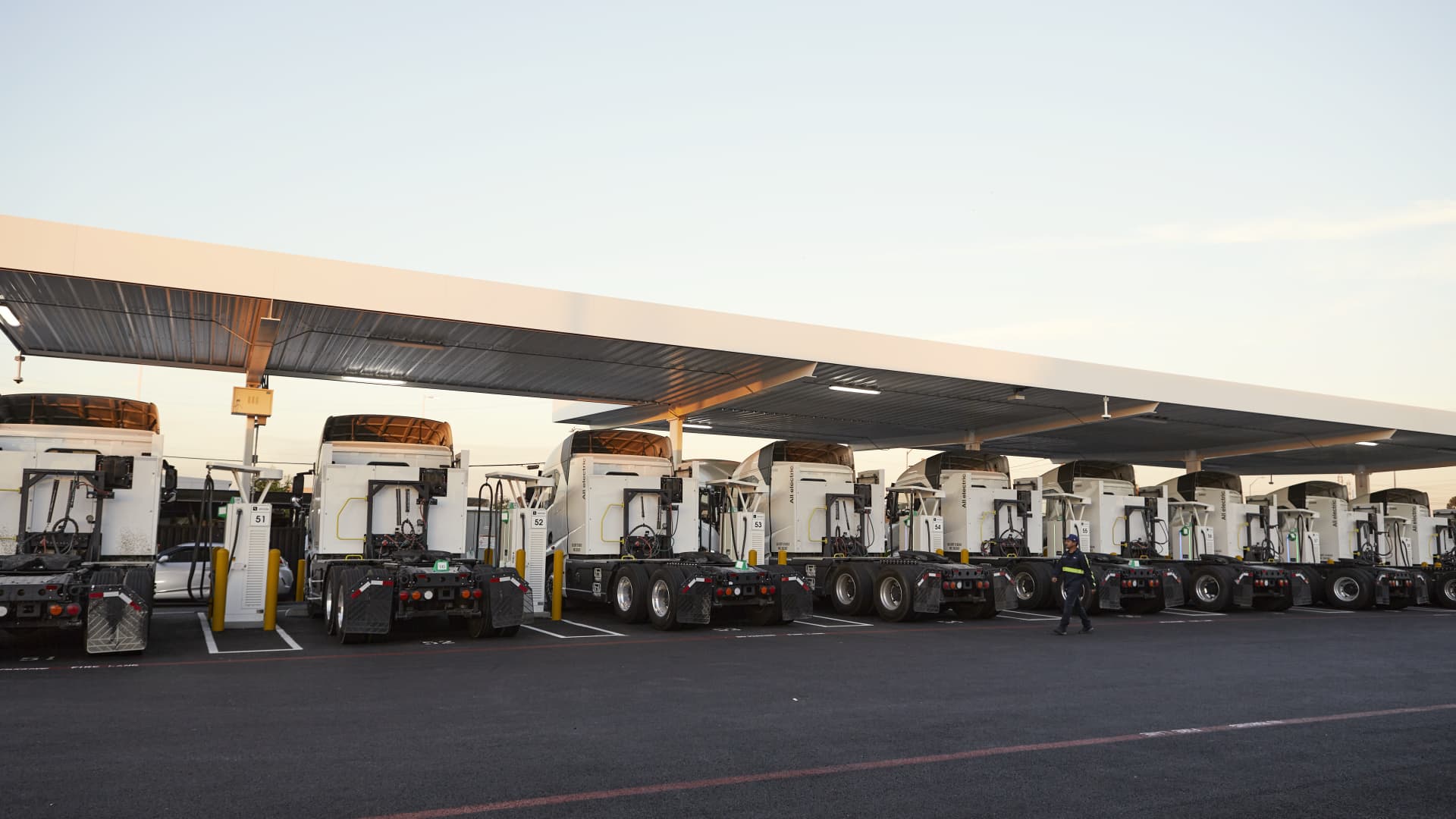The Einride EV cargo truck charging station in Lynwood, California, built by Voltera and located near the ports of Los Angeles and Long Beach.
Einride
One of the first large-scale truck EV charging stations is opening near the major ports of Los Angeles and Long Beach, California, as the trucking market takes some limited but significant steps to build the infrastructure needed for a long-term transition to EVs trucking and net zero.
Built by Sweden-based freight mobility company Einride and EV charging infrastructure company Voltera, the Lynwood Smartcharger station along Interstate 710 has 65 chargers and the ability to charge 200 vehicles per day, initially on routes operated by global shipping giant AP Moller-Maersk, which is also a venture investor in Einride, which was named to CNBC’s 2023 Disruptor 50 list.
The Ports of Los Angeles and Long Beach handle 29% of all ocean freight container traffic coming into the US
“The launch of Einride’s first Smartcharger station in the U.S. marks an important step in establishing digital, electric freight as an important enabler for a more sustainable U.S. freight system,” said Robert Falk, CEO and founder of Einride, in a statement.
Founded in 2016, Einride operates one of the largest fleets of heavy-duty electric trucks for major companies, including Pepsi.
Voltera, which develops, owns and operates EV infrastructure, said the site was permitted, built, electrified and operational in less than 18 months. “In the world of charging infrastructure, this is quite remarkable,” CEO Matt Horton said in a statement.
Einride plans to open many EV charging stations for freight on the West and East coasts, although California is the only state with EV charging stations at scale today. In addition to the new Lynwood station, a logistics company NFI Announces Charging Station for Cargo EVs in February, which can accommodate up to 50 trucks, including from Volvo, in a collaboration with Electrify America and Southern California Edison. The NFI EV charging station for port trucks is located at the Ontario, California warehouse, also a strategic location to serve the major ports of Southern California.
Due to the range limitations faced by EV truck batteries, trucking companies and EV partners are focusing on dredging and short-haul goods movement for use in ports and intermodal logistics facilities.
Eric Neandros, chief executive of transport consultancy GNA, which works with low-carbon and zero-emission freight clients, said servicing 50 or more trucks is a different level than what has been done in the market so far. trucking, but added that it is still early in the development of truck-scale EV charging. “We’re super early. It’s fair to say we’re in the first half of the first inning. California is really the epicenter of activity of this scale and magnitude,” he said.
The California government has been aggressive in offering grants and incentives to build EV infrastructure, and has also approved its utilities to spend $750 million on the development, making a significant difference in a market where there are still few EV trucks on the road or charging stations. in-service charging, making it difficult to prove cost competitiveness with diesel.
Government and utility spending combined with regulations to reach net zero by 2040 — and the need among major shippers such as consumer products companies and major retailers, from Pepsi to Walmart, to meet their own carbon targets — create an environment in which more investment in the US freight market will emerge.
The California Air Resources Board requires truck manufacturers to begin phasing in available heavy-duty electric vehicle technology this year, with the expectation of having all short-haul fleets zero-emission by 2035. Medium- and heavy-duty trucks make up only about 4 percent of vehicles in The U.S., however, consumes more than 25 percent of total highway fuel and accounts for nearly 30 percent of highway carbon emissions, according to the Department of Energy.
Additional EV charging projects are planned at ports in New York and New Jersey, as well as in the Pacific Northwest.
“Now is the time to test it before the next few fleet buying cycles,” Neandros said. “There’s nothing like building infrastructure to go and see, to learn. This is where we are today.”
The entire supply chain, from product manufacturing to a container shipped all the way from Shanghai to Chicago, will require a complex net-zero equation, and shippers and shipping companies are targeting everything from energy use in factories to raw materials, packaging and logistics. “To get to net zero, you have to do everything,” Neandros said. “Many of the companies we work with are working hard on the non-transportation side. Take Pepsi, they went out of their way to put in LED lights and buy renewable energy and maximize production efficiency. Now it’s time to tackle the trucks and logistics part. It’s hard, but it has to be done.”
The Environmental Protection Agency released new emissions mandates for cars and pickup trucks this week, and the EPA is expected soon to issue new emissions requirements for medium- and heavy-duty trucks that will make alternatives to diesel engines more competitive, including both CNG and CNG. gas powered trucks and zero emission EV trucks.
https://www.cnbc.com/2024/03/21/ev-charging-for-the-us-freight-trucking-market-is-starting-to-scale.html







